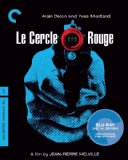| Reviews & Columns |
|
Reviews DVD TV on DVD Blu-ray 4K UHD International DVDs In Theaters Reviews by Studio Video Games Features Collector Series DVDs Easter Egg Database Interviews DVD Talk Radio Feature Articles Columns Anime Talk DVD Savant Horror DVDs The M.O.D. Squad Art House HD Talk Silent DVD
|
DVD Talk Forum |
|
|
| Resources |
|
DVD Price Search Customer Service #'s RCE Info Links |
|
Columns
|
|
|
Le Cercle Rouge: The Criterion Collection
The Criterion Collection // Unrated // April 12, 2011
List Price: $39.95 [Buy now and save at Amazon]
The Film:
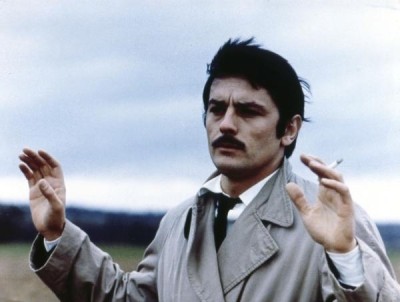 Despite all appearances, I'm no professional.
Despite all appearances, I'm no professional.
Jean-Pierre Melville's work in the realm of thieves and gangsters embodies the very essence of "cool". He peppers minimal, surgically-used dialogue in scenes that move through urban environments with a deft awareness of immediacy, knowing when words are needed and when silence stands paramount. Though Melville's iconic Le Samouraï and Bob Le Flambeur focus on the composure of criminals in this silence, analyzing their instincts and maneuvers, his next-to-last picture Le Cercle Rouge concentrates more on the magnetic pull that draws them together, along with an exploration of the "honor amongst thieves" idea -- and lack thereof. With very few words spoken and Éric Demarsan's music backing the movement, it's at once a cat-and-mouse caper, an intriguing character piece, and a brilliant heist thriller that, though restrained, rarely feels the length of its brisk two-and-a-half hours.
Melville again teams up with Alain Delon in Le Cercle Rouge, employing his chiseled jaw and piercing eyes to bring smooth criminal Corey to life. Recently released from prison and jettisoning away from his previous mobster employer, whom Corey's just robbed, he happens upon a high-profile escaped criminal named Vogel (Gian Maria Volonté), currently being hunted by the shrewd yet soft-spoken Captain Mattei (Bourvil) in an expansive search stretching across the city and countryside. With both men needing a way to obtain financial security so they can essentially go underground and disappear, they orchestrate a heist on a ritzy, loaded jewelry store in the heart of Paris. Along with the assistance of a compromised, boozed-up ex-cop named Jansen (Yves Montand of Z), the three men plot a way to bypass the security, grab the jewels, and fence their millions of dollars worth of gems.
Before the opening credits, Melville posits a (fake) Buddhist saying that suggests destiny leads like-minded individuals to a given point, "the red circle". It introduces the concept of predestination and the futility of deviating from that path, as well as nudging towards an even field for those that enter it. Melville sets the tone with the anecdote by planting it as a provocative seed long before the point where the criminals meet, giving a little something to chew on as Corey and Vogel escape the law and Jansen -- someone who once prosecuted the wicked -- assists in their ploy. The French director habitually toys with the morality and mentality of criminals in his oeuvre, fascinated with the honor code among them, and Le Cercle Rouge certainly doesn't deviate for that; yet there's an infectious air of fortune and doom that lingers throughout Melville's film, one that injects philosophical vigor in the mix.
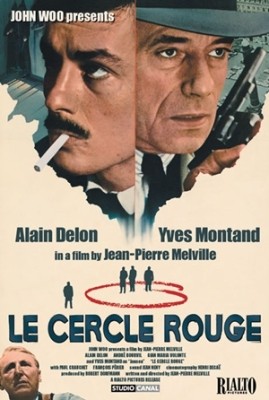 The story that follows isn't as complex or cryptic as its prologue, but Melville writes it with a razor-sharp, matter-of-fact edge that makes it quite gripping, aided exponentially by pitch-perfect performances. Le Cercle Rouge follows a structure familiar to those both seasoned to the heist film genre and to Melville's work, sectioned into three chunks that follow the escape, the meeting, and the execution of their endgame. Under Melville's pen, though, this structure achieves a certain fluidity that's rarely seen in works outside of the French director's catalogue, in which he makes each subtly-introduced element an essential component. He's acutely aware of the cinematic language and the way it communicates to the audience's senses and sensibilities, which becomes highly noticeable when he presents how someone picks a pair of handcuffs or how a horde of French police officers line up with their dogs on a long, grassy field. And let's not forget the rhythmic dance number in the pit of Santi's club, where Corey sits stoically, alone and unaffected by the place's energy.
The story that follows isn't as complex or cryptic as its prologue, but Melville writes it with a razor-sharp, matter-of-fact edge that makes it quite gripping, aided exponentially by pitch-perfect performances. Le Cercle Rouge follows a structure familiar to those both seasoned to the heist film genre and to Melville's work, sectioned into three chunks that follow the escape, the meeting, and the execution of their endgame. Under Melville's pen, though, this structure achieves a certain fluidity that's rarely seen in works outside of the French director's catalogue, in which he makes each subtly-introduced element an essential component. He's acutely aware of the cinematic language and the way it communicates to the audience's senses and sensibilities, which becomes highly noticeable when he presents how someone picks a pair of handcuffs or how a horde of French police officers line up with their dogs on a long, grassy field. And let's not forget the rhythmic dance number in the pit of Santi's club, where Corey sits stoically, alone and unaffected by the place's energy.
Melville's suave style melds Le Cercle Rouge together into an effortless rush of sober, complete cinematic craftsmanship. Smooth camera work lets mannerisms to speak louder than words would, allowing the two convicts' stories to stay partitioned at first, then interweave near the film's second half. Melville takes his time as the tempo methodically burns, allowing Corey and Vogel's demeanors to manifest before our eyes in a way that familiarizes us with them, replacing the strings of dialogue that would construct predictable byzantine archetypes with a perceptive, meaningful eye for human interaction. Just as the film requires a breath of air from its stifled glances at gloomy antiheroes, Melville intuitively integrates a moment of circumstantial anxiety -- a vehicle roadblock here, crossing a river there. Between the weight of their weathered tempers and the suspense scuttling behind their escape, there's never a lack of tension.
The crucial boiling point in Le Cercle Rouge comes in the brilliantly-executed heist, which takes up over half an hour close to the film's conclusion. There's so much to marvel over within Melville's restrained, steadfast hand here, which utilizes the silence that the thieves painstakingly avoid instead of sprucing it up with energetic music to give it a false sense of momentum. No, this film relishes in the soundless air around and in the jewelry store, which allows the slightest of noises -- the pitter-patter of sock-adorned feet, the cutting of glass, the cranking of a tripod -- to replicate the gust of nervousness that they'd likely experience. Melville handles all the well-researched details, from the makeshift tools used to the layout of the building, with such an unforced poise that it's simply breathtaking to watch in motion, like watching the gears move in an expensive timepiece. You know what it's doing and what'll come of the mechanics in motion, but that doesn't hold someone back from acknowledging its mesmerizing execution.
The Blu-ray:
The Criterion Collection have reached into their deep satchel to uptick Le Cercle Rouge for the high-definition format, again presenting it as spine #218 for this Blu-ray. A Booklet adorns the standard clear-case presentation, which includes interviews with Jean-Pierre Melville and Eric Demarsanon, several essays -- "Le Cercle Rouge" by Micheal Sragow, and "What Is The Red Circle" by Chris Fujiwara -- as well as technical specs for the Blu-ray's authoring process and production credits.
Video and Audio:
As with Criterion's other high-definition releases, Le Cercle Rouge arrives in an extremely clean 1.85:1 1080p AVC encode that's stricken on a Datacine scanner from a restored 35mm interpositive. Only a few minor speckles appear in this somewhat dark presentation, nothing that can really be seen unless inspecting closely, while a noticeable coat of film-grain drapes over the muted palette to varying degrees of heaviness. The color timing appears well-balanced with the film's intended style as skin colors switch between normal warmth and more reserved saturation, while a few eye-popping shades -- the individual bright-colored panes in a colorful lamp, the soft glow of a neon sign outside of Santi's club, and the soft-blue refractions from streetlamps -- pour through the print with nimble competence.
Criterion's treatment works its magic on the shimmering of light and textures on surfaces as well, such as the car registration slip Corey holds in Santi's bar and the felt on a pool table, while also dancing around the heavy contrast in the photography fairly well. A few moments do crop up where the contrast grows dark and thick, swallowing up detail in ways questionable to the artistic intent. Other nighttime scenes, on the other side of the coin, exercise an impressive eye for the details surrounded by near pitch-black darkness. Riding a bitrate that hits the high-30s in Mbps on a regular basis and flowing at natural 24fps, this new presentation handles itself more often than not with composure in regards to sharpness, palette saturation and high-definition competency for a film of its vintage.
Audio arrives in a one-channel French PCM track stricken from the original 35mm magnetic strips, which eloquently handles the film's mix of jazzy rhythms, brusque dialogue and ... silence. Cars roarin' down streets and a few gunshots show off the sound treatment's limits in only scraping the top layer of lower-end activity, while the handful of bullet ricochets and screeching train wheels find the right balance between high punch and suppressed intensity. The chunk of the middle-range activity pours through during the dance sequences in the nightclub, along with the moments when the jazz music overpowers the sound design. Where the aural treatment really shines is during stretches of near-silence, especially during the heist; the sound of slight ticking stands out as the only thing that can be heard, with nary an instance of clicking, blips, or hissing to be heard. Nothing but the slight sounds that you're supposed to hear, and it's wonderful in its ability to do so. English subtitles, which are terrific, accompany the French language track.
Special Features:
Archival Footage (4x3, HD AVC):
Under this header, five different pieces are made available that individually cover elements of Jean-Pierre Melville's cinematic doings. Cineastes de Notre Temps (27:19), or "Portrait in Nine Poses", offers a glimpse into the multifaceted activities that the director undertakes, which includes a neat sequence where he watches raw footage from Le Cercle Rouge in the editing room. Pour Le Cinema (5:20) and MIDI Magazine (4:37) find Melville talking about "returning to the flames" with the crime thriller, while also including black-and-white behind-the-scenes footage of Alain Delon -- both while acting, and amid an interview. Vingt-Quatre Hueres Sur La Deux (3:43) offers a quick interview excerpt from an episode of the series that focuses on Melville and especially Delon, while Morceaux De Bravoure (9:49) hits on Melville's American influences (where he name-drops Asphalt Jungle, among others).
Barnard Stora (30:14, AVC):
Shot in 2003 for StudioCanal, this interview with assistant director Stora covers rehearsals (and Melville's typical one-take habit), making something unique out of small lines in the script, and his admiration for the American culture. He talks about his late-night drives with Melville, the way Melville's somewhat free-form style shaped the cinematic world, and his perception of cinematic space and his actors. Starting at around the 13:00 mark, he starts to discuss Le Cercle Rouge in a bit of depth and detail, including some talk about the franticness around a day of shooting with animals (both real and puppet) and shooting in Paris.
Rui Nogueira (26:14, AVC):
The author of Melville on Melville muses a bit about the director, from his sense of humor to further talk about his love of all things American, as well as the process of writing his book (primarily taking place during shooting of Le Cercle Rouge). He discusses Jean-Luc Godard's experimentalism a bit, as well as how true classic films and directors are made -- and made durable over time. He also discusses some interesting philosophical contradictions that occurred on-set during Le Cercle Rouge, as well as many other reflections on the film's workings.
Rounding things out are two trailers: the Original Theatrical Release (1:54, HD AVC) trailer, and the almost identical Rialto Pictures' 2003 Re-release (2:04, HD AVC) trailer. The only real differences between the two are the colors, the overall quality of the prints, and the portion at the end that runs through critic quotes, the "Presented by John Woo" message, and the Rialto Pictures' website.
Final Thoughts:
Le Cercle Rouge takes all the things that hallmark French director Jean-Pierre Melville's style -- sharp dialogue, intriguing glimpses at the honor among criminals, and an undeniable coolness -- and concentrates them into a brilliantly-structured crime drama, one capped off with one of the best, most realistic heists ever recorded on film. The French director misses few beats in his fluidly-moving picture, coasting along at an addictive low-key pace until the film's breathless thirty-minute cornerstone sequence. The Criterion Collection have preserved Melville's minor masterpiece in a rather good high-definition presentation, which includes the archival footage and interviews from their two-disc DVD presentation. Highly Recommended.
Thomas Spurlin, Staff Reviewer -- DVDTalk Reviews | Personal Blog/Site
 Despite all appearances, I'm no professional.
Despite all appearances, I'm no professional. Jean-Pierre Melville's work in the realm of thieves and gangsters embodies the very essence of "cool". He peppers minimal, surgically-used dialogue in scenes that move through urban environments with a deft awareness of immediacy, knowing when words are needed and when silence stands paramount. Though Melville's iconic Le Samouraï and Bob Le Flambeur focus on the composure of criminals in this silence, analyzing their instincts and maneuvers, his next-to-last picture Le Cercle Rouge concentrates more on the magnetic pull that draws them together, along with an exploration of the "honor amongst thieves" idea -- and lack thereof. With very few words spoken and Éric Demarsan's music backing the movement, it's at once a cat-and-mouse caper, an intriguing character piece, and a brilliant heist thriller that, though restrained, rarely feels the length of its brisk two-and-a-half hours.
Melville again teams up with Alain Delon in Le Cercle Rouge, employing his chiseled jaw and piercing eyes to bring smooth criminal Corey to life. Recently released from prison and jettisoning away from his previous mobster employer, whom Corey's just robbed, he happens upon a high-profile escaped criminal named Vogel (Gian Maria Volonté), currently being hunted by the shrewd yet soft-spoken Captain Mattei (Bourvil) in an expansive search stretching across the city and countryside. With both men needing a way to obtain financial security so they can essentially go underground and disappear, they orchestrate a heist on a ritzy, loaded jewelry store in the heart of Paris. Along with the assistance of a compromised, boozed-up ex-cop named Jansen (Yves Montand of Z), the three men plot a way to bypass the security, grab the jewels, and fence their millions of dollars worth of gems.
Before the opening credits, Melville posits a (fake) Buddhist saying that suggests destiny leads like-minded individuals to a given point, "the red circle". It introduces the concept of predestination and the futility of deviating from that path, as well as nudging towards an even field for those that enter it. Melville sets the tone with the anecdote by planting it as a provocative seed long before the point where the criminals meet, giving a little something to chew on as Corey and Vogel escape the law and Jansen -- someone who once prosecuted the wicked -- assists in their ploy. The French director habitually toys with the morality and mentality of criminals in his oeuvre, fascinated with the honor code among them, and Le Cercle Rouge certainly doesn't deviate for that; yet there's an infectious air of fortune and doom that lingers throughout Melville's film, one that injects philosophical vigor in the mix.
 The story that follows isn't as complex or cryptic as its prologue, but Melville writes it with a razor-sharp, matter-of-fact edge that makes it quite gripping, aided exponentially by pitch-perfect performances. Le Cercle Rouge follows a structure familiar to those both seasoned to the heist film genre and to Melville's work, sectioned into three chunks that follow the escape, the meeting, and the execution of their endgame. Under Melville's pen, though, this structure achieves a certain fluidity that's rarely seen in works outside of the French director's catalogue, in which he makes each subtly-introduced element an essential component. He's acutely aware of the cinematic language and the way it communicates to the audience's senses and sensibilities, which becomes highly noticeable when he presents how someone picks a pair of handcuffs or how a horde of French police officers line up with their dogs on a long, grassy field. And let's not forget the rhythmic dance number in the pit of Santi's club, where Corey sits stoically, alone and unaffected by the place's energy.
The story that follows isn't as complex or cryptic as its prologue, but Melville writes it with a razor-sharp, matter-of-fact edge that makes it quite gripping, aided exponentially by pitch-perfect performances. Le Cercle Rouge follows a structure familiar to those both seasoned to the heist film genre and to Melville's work, sectioned into three chunks that follow the escape, the meeting, and the execution of their endgame. Under Melville's pen, though, this structure achieves a certain fluidity that's rarely seen in works outside of the French director's catalogue, in which he makes each subtly-introduced element an essential component. He's acutely aware of the cinematic language and the way it communicates to the audience's senses and sensibilities, which becomes highly noticeable when he presents how someone picks a pair of handcuffs or how a horde of French police officers line up with their dogs on a long, grassy field. And let's not forget the rhythmic dance number in the pit of Santi's club, where Corey sits stoically, alone and unaffected by the place's energy. Melville's suave style melds Le Cercle Rouge together into an effortless rush of sober, complete cinematic craftsmanship. Smooth camera work lets mannerisms to speak louder than words would, allowing the two convicts' stories to stay partitioned at first, then interweave near the film's second half. Melville takes his time as the tempo methodically burns, allowing Corey and Vogel's demeanors to manifest before our eyes in a way that familiarizes us with them, replacing the strings of dialogue that would construct predictable byzantine archetypes with a perceptive, meaningful eye for human interaction. Just as the film requires a breath of air from its stifled glances at gloomy antiheroes, Melville intuitively integrates a moment of circumstantial anxiety -- a vehicle roadblock here, crossing a river there. Between the weight of their weathered tempers and the suspense scuttling behind their escape, there's never a lack of tension.
The crucial boiling point in Le Cercle Rouge comes in the brilliantly-executed heist, which takes up over half an hour close to the film's conclusion. There's so much to marvel over within Melville's restrained, steadfast hand here, which utilizes the silence that the thieves painstakingly avoid instead of sprucing it up with energetic music to give it a false sense of momentum. No, this film relishes in the soundless air around and in the jewelry store, which allows the slightest of noises -- the pitter-patter of sock-adorned feet, the cutting of glass, the cranking of a tripod -- to replicate the gust of nervousness that they'd likely experience. Melville handles all the well-researched details, from the makeshift tools used to the layout of the building, with such an unforced poise that it's simply breathtaking to watch in motion, like watching the gears move in an expensive timepiece. You know what it's doing and what'll come of the mechanics in motion, but that doesn't hold someone back from acknowledging its mesmerizing execution.
The Blu-ray:
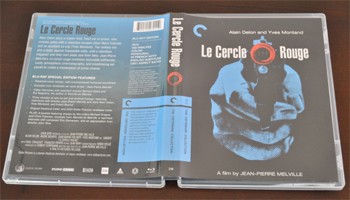 | 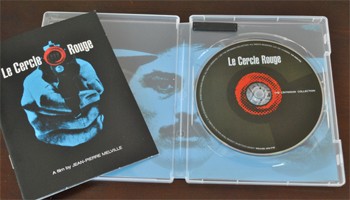 |
The Criterion Collection have reached into their deep satchel to uptick Le Cercle Rouge for the high-definition format, again presenting it as spine #218 for this Blu-ray. A Booklet adorns the standard clear-case presentation, which includes interviews with Jean-Pierre Melville and Eric Demarsanon, several essays -- "Le Cercle Rouge" by Micheal Sragow, and "What Is The Red Circle" by Chris Fujiwara -- as well as technical specs for the Blu-ray's authoring process and production credits.
Video and Audio:
As with Criterion's other high-definition releases, Le Cercle Rouge arrives in an extremely clean 1.85:1 1080p AVC encode that's stricken on a Datacine scanner from a restored 35mm interpositive. Only a few minor speckles appear in this somewhat dark presentation, nothing that can really be seen unless inspecting closely, while a noticeable coat of film-grain drapes over the muted palette to varying degrees of heaviness. The color timing appears well-balanced with the film's intended style as skin colors switch between normal warmth and more reserved saturation, while a few eye-popping shades -- the individual bright-colored panes in a colorful lamp, the soft glow of a neon sign outside of Santi's club, and the soft-blue refractions from streetlamps -- pour through the print with nimble competence.
Criterion's treatment works its magic on the shimmering of light and textures on surfaces as well, such as the car registration slip Corey holds in Santi's bar and the felt on a pool table, while also dancing around the heavy contrast in the photography fairly well. A few moments do crop up where the contrast grows dark and thick, swallowing up detail in ways questionable to the artistic intent. Other nighttime scenes, on the other side of the coin, exercise an impressive eye for the details surrounded by near pitch-black darkness. Riding a bitrate that hits the high-30s in Mbps on a regular basis and flowing at natural 24fps, this new presentation handles itself more often than not with composure in regards to sharpness, palette saturation and high-definition competency for a film of its vintage.
Audio arrives in a one-channel French PCM track stricken from the original 35mm magnetic strips, which eloquently handles the film's mix of jazzy rhythms, brusque dialogue and ... silence. Cars roarin' down streets and a few gunshots show off the sound treatment's limits in only scraping the top layer of lower-end activity, while the handful of bullet ricochets and screeching train wheels find the right balance between high punch and suppressed intensity. The chunk of the middle-range activity pours through during the dance sequences in the nightclub, along with the moments when the jazz music overpowers the sound design. Where the aural treatment really shines is during stretches of near-silence, especially during the heist; the sound of slight ticking stands out as the only thing that can be heard, with nary an instance of clicking, blips, or hissing to be heard. Nothing but the slight sounds that you're supposed to hear, and it's wonderful in its ability to do so. English subtitles, which are terrific, accompany the French language track.
Special Features:
Archival Footage (4x3, HD AVC):
Under this header, five different pieces are made available that individually cover elements of Jean-Pierre Melville's cinematic doings. Cineastes de Notre Temps (27:19), or "Portrait in Nine Poses", offers a glimpse into the multifaceted activities that the director undertakes, which includes a neat sequence where he watches raw footage from Le Cercle Rouge in the editing room. Pour Le Cinema (5:20) and MIDI Magazine (4:37) find Melville talking about "returning to the flames" with the crime thriller, while also including black-and-white behind-the-scenes footage of Alain Delon -- both while acting, and amid an interview. Vingt-Quatre Hueres Sur La Deux (3:43) offers a quick interview excerpt from an episode of the series that focuses on Melville and especially Delon, while Morceaux De Bravoure (9:49) hits on Melville's American influences (where he name-drops Asphalt Jungle, among others).
Barnard Stora (30:14, AVC):
Shot in 2003 for StudioCanal, this interview with assistant director Stora covers rehearsals (and Melville's typical one-take habit), making something unique out of small lines in the script, and his admiration for the American culture. He talks about his late-night drives with Melville, the way Melville's somewhat free-form style shaped the cinematic world, and his perception of cinematic space and his actors. Starting at around the 13:00 mark, he starts to discuss Le Cercle Rouge in a bit of depth and detail, including some talk about the franticness around a day of shooting with animals (both real and puppet) and shooting in Paris.
Rui Nogueira (26:14, AVC):
The author of Melville on Melville muses a bit about the director, from his sense of humor to further talk about his love of all things American, as well as the process of writing his book (primarily taking place during shooting of Le Cercle Rouge). He discusses Jean-Luc Godard's experimentalism a bit, as well as how true classic films and directors are made -- and made durable over time. He also discusses some interesting philosophical contradictions that occurred on-set during Le Cercle Rouge, as well as many other reflections on the film's workings.
Rounding things out are two trailers: the Original Theatrical Release (1:54, HD AVC) trailer, and the almost identical Rialto Pictures' 2003 Re-release (2:04, HD AVC) trailer. The only real differences between the two are the colors, the overall quality of the prints, and the portion at the end that runs through critic quotes, the "Presented by John Woo" message, and the Rialto Pictures' website.
Final Thoughts:
Le Cercle Rouge takes all the things that hallmark French director Jean-Pierre Melville's style -- sharp dialogue, intriguing glimpses at the honor among criminals, and an undeniable coolness -- and concentrates them into a brilliantly-structured crime drama, one capped off with one of the best, most realistic heists ever recorded on film. The French director misses few beats in his fluidly-moving picture, coasting along at an addictive low-key pace until the film's breathless thirty-minute cornerstone sequence. The Criterion Collection have preserved Melville's minor masterpiece in a rather good high-definition presentation, which includes the archival footage and interviews from their two-disc DVD presentation. Highly Recommended.
|
| Popular Reviews |
| Sponsored Links |
|
|
| Sponsored Links |
|
|
| Release List | Reviews | Shop | Newsletter | Forum | DVD Giveaways | Blu-Ray | Advertise |
|
Copyright 2024 DVDTalk.com All Rights Reserved. Legal Info, Privacy Policy, Terms of Use,
Manage Preferences,
Your Privacy Choices | |||||||









